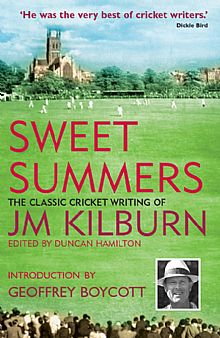The weekend read – Sweet Summers: The Classic Cricket Writing of JM Kilburn
February 27th, 2009 by TWC in Miscellaneous
Every Friday we’ll be picking a classic cricket book that has been reviewed in TWC to help you pass the weekend. Make your recommendations in the comments below.
What is it?
Sweet Summers: The Classic Cricket Writing of JM Kilburn Edited by Duncan Hamilton, (Great Northern Books, hb, 448pp, £15.29)
What’s it all about then?
Yorkshire cricket writer who adored the aesthetics of the game and deplored its commercialisation
What did we give it?
4/5
What did we say?
JM Kilburn treated cricket like an art form and wrote about it like a critic. He was cricket correspondent of the Yorkshire Post from the 1930s until the mid-1970s and this collection of his writing could well have been subtitled with Harold Pinter’s epic poem: “I saw Len Hutton in his prime/ Another time, another time.” Kilburn was a respected but rather severe figure; a pipe-smoker addicted to a post-prandial nap and contemptuous of reporting “dressing-room tittle-tattle” in newspapers. Duncan Hamilton, who edited the collection, writes: “The aesthetics of cricket were paramount to him.”
Kilburn observed fundamental change in first-class cricket and he did not like it. He deplored player-agents, one-day cricket, the end of the distinction between amateurs and professionals and, worst of all, television. He condemned sponsors and TV as “money-lenders”; “televised cricket is, basically, not cricket but a television show”. He regarded virtually every change in first-class cricket as a soft option.
Maybe he was a curmudgeonly Yorkshireman but he had heroes and wrote well about players such as Keith Miller, Brian Close and Hedley Verity – “to dismiss a modest batting side was to him [Verity] no more than the routine of a bank clerk completing a simple balance”. He admired Bill Bowes, who bowled fast for Yorkshire and England and eventually became Kilburn’s friend and colleague. He uses Bowes’ example to malign other international cricketers who have sought to make the transition from playing field to press box: “The majority glowing briefly in the flattering light of the reception desk are soon elbowed aside to disappear with the consolation of an inflated fee.”
The curious thing about this book, which honours a man who was a member of the same league as Neville Cardus, RC Robertson-Glasgow and Jack Fingleton, is that it has become an instrument with which to beat modern cricket writers. It starts with a predictable gob of bile from Geoffrey Boycott, whose preface complains that journalists prefer to string together other people’s opinions rather than form any of their own.
Hamilton, who is deputy editor of the Yorkshire Post, agrees. “Newspapers,” he says, now rely on quotes, however anodyne or trivial, rather than judgement.” While it is true that a platoon of second-string cricket writers faithfully record what players say at the end of the day, Hamilton’s contention is nonsense. Do we turn to Mike Atherton, Mike Selvey, Angus Fraser, Derek Pringle or Vic Marks to read anodyne and trivial quotes? No, we expect lively narratives spiced with well-informed judgements. And we get them. These former players are now more concerned with the psychology than the aesthetics of cricket, but they are none the worse for that.
Cricket writers with experience in journalism rather than the England team sometimes regret the speed with which retired players smooth their way into the best jobs. The charge would stand if these gilded converts let down their readers by failing to provide thoughtful and accurate commentary. But they don’t. Indeed I suspect Kilburn would have enjoyed reading them.
Stephen Fay, October 2008
What did they say?
Yorkshire cricketers were not renowned for their lightness of touch or flights of fancy. Neither was their finest writer. Kilburn’s writing evoked Sutcliffe, Hutton and Boycott - sound, hard, correct, rather than flamboyant. Yet, like them he was capable of evoking the occasional gasp of surprise. His description of Maurice Leyland’s bowling is sheer joy: “Leyland’s bowling is mostly a joke, but it is an extremely practical joke.”
Suresh Menon, Cricinfo.com
He was undoubtedly among the finest of cricket writers, with echoes of Neville Cardus yet leaner, tougher. But it is impossible to imagine him being a cricket correspondent today, or even wanting to be one.
Harry Mead, The Northern Echo
Why not tell us what your favourite cricket book is, or which book you’d like to see in ‘The weekend read’ in the comments below …
Posted in Miscellaneous | No Comments »

